Sacred Spaces: Baha’is in Baptist Jerusalem - The Waco Baha'i Center
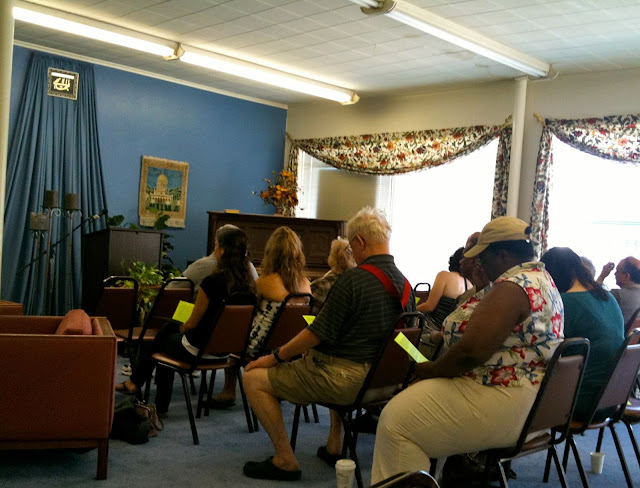 |
| Photo used with permission from the Spiritual Assembly of the Baha’is in Waco, TX |
Sacred Spaces #4
Baha'is in Baptist Jerusalem: Visiting The Waco Baha'i Center
by Kyle Desrosiers
Robbins Chapel, Hillcrest Hospital, Waco
Waco is also home to a small community of Baha'is, a religious group who never get much attention in the national media. One could easily miss their single, unassuming place of worship in this town full of Christian churches. Since the 1990s, the religion has maintained its own spiritual center at Bosque Blvd. and 25th Street in the middle of a mostly working-class Latin part of town. The building takes up 1500 square feet in an outdated strip mall. Across the street stand a dilapidated auto-mechanic shop and a oversized billboard warning passing drivers of the dangers of internet pornography.
“We might not look like much,” Bill told me. “But we can sometimes have twenty or thirty people in attendance on holidays. I think we are more diverse ethnically than any other place of worship in town.”
The service was starting in only a quarter of an hour. Nobody else had arrived yet. I took advantage of this time to ask more questions. “My family is originally from Chicago, where there are more Baha’is than in Waco,” Bill explained. “My parents converted over 40 years ago after seeing the dedicated Baha’i effort in the civil rights movement.” (The United States Baha'i House of Worship, or temple, is located in Wilmette, Illinois. Houses of Worship differ from Haziratu'l-Quds, or local Baha'i centers. The House of Worship is for prayer, meditation, and scripture reading, not for giving sermons. Devotions are held in local centers, such as the one in Waco).
The Baha’i faith teaches about the oneness of God and unity of all humankind, which means a special dedication to the fight for racial equity. My new friend proudly told me about the lives of the Baha'i faith prophets, pulling book after book off wooden shelves, and showing me pictures of places and people.
“Our religion is radical but not illogical,” Bill said. “We don’t water down the power of God or his revelation to mankind. Instead, we try to delve into the unity of all faiths and how they all point back to the same source of goodness and truth.”
We sat on a cracked leather couch, and I got a crash-course on one of the newest and fastest growing world religions. The Baha’i Faith did not originate in Waco. Its origin place is about as far from Waco as one can get: Iran. The religion was founded in the mid-nineteenth century by a man called the Bab, or “the gate” in Persian. He came from a Shia Muslim community, the dominant religion of Persia. The Bab claimed to be a prophetic voice, the Hidden Imam of Shia tradition. He challenged the legalism of Muslim Sharia law and brought a theological argument for the unity of all people and religions.
Baha’is hold that, “throughout the ages, God has sent Divine Messengers known as Manifestations of God—among them Abraham, Krishna, Zoroaster, Moses, Buddha, Jesus Christ, Muhammad, and, in more recent times, the Báb and Bahá’u’lláh—to cultivate humanity’s spiritual, intellectual and moral capacities” (Bahai.org).
It is a faith that has spread far and wide. The worldwide Baha’i population is estimated to be 8 million, and is statistically growing faster than Islam or Christianity. In Waco, however, the community is shrinking and its members are aging fast.
The Baha'is have been in Waco since the mid 1950s. Among the first was Jack McCant and his family. McCant was a Methodist minister who converted and later became one of the U.S. National Spiritual Assembly members of the Baha’i governing body.
As Bill and I talked about the religion, I glanced around the empty room. A large clock on the wall reported that the worship should have started almost 10 minutes ago. My questions had been answered, and we arrived at a lull in the conversation. “Shall we begin?” Bill asked, “It’s about that time.” It seemed it would just be the two of us in the congregation. Bill, it just so happened, was also leading worship that day.
I took a seat in the sanctuary, and he stood at the wooden Baptist-style pulpit to read an opening prayer from the Kitáb-i-Aqdas, the Baha’i holy book. The prayer talked about the unity of God and the oneness of humankind, with something that mirrored a Christian liturgical collect that made special prayers for racial equity and justice in America.
The congregation – just the two of us – stood to sing a hymn. Then, Bill ran from the pulpit to the back of the room to pop in a CD of spiritual instrumental music for a time of personal contemplation and prayer. Afterwards, Bill motioned me forward to the pulpit, “Would you like to read the Scripture for the day for us?”
I read excerpts from the Hebrew Old Testament and the Qur'an. Both verses discussed the wickedness of oppression, reflecting on God’s call for justice. I returned to my seat, and we joined in a collective reading. Then, Bill read a closing prayer, and we listened to another meditative soundtrack. Before I knew it, worship was over. There was no sermon, and it was even shorter and sweeter than an Episcopal service on Superbowl Sunday.
I thanked Bill for his hospitality, took an armload of brochures, and promised to be back. “The thing about us Baha’is is that we don’t really evangelize,” Bill laughed. “But you should come to our special holiday celebration next week. It is the 200th anniversary of the birth of one of our messengers.”
As I left the Baha’i Center that morning, I felt slightly embarrassed at being asked to lead, but was mostly grateful for the hospitality shown to me. I ended up going to the holiday event, a community dinner and film screening to commemorate the birth of the Bab. This time, I took a friend with me, so I’d know that at least three people would be there.
Luckily, at this event, there were about twenty-five Baha’is and friends from other local faith communities. At the dinner, I sat next to a sixty-year-old white woman with dark hair, named Brenda Khozein, who has become a local voice for the Baha’is.
"I have been Baha’i since my twenties. The first Baha’i person I met was also the first black person I ever knew,” she explained. “I grew up in Vidor, Texas, which was a sundown city in those days. The KKK was alive and well, and I remember seeing crosses burning in the fields.”
Like many others, Brenda saw the Baha’i faith as a path to challenging hatred, division, and tribalism in a world dominated by divisive systems of race, class, and supremacy. She was drawn to the ethnic diversity of the congregations and its message of unity. It is this very message of unity that many outsiders find controversial. Many Baha'is have been persecuted in their homeland, Iran, and beyond.
“My husband is from Iran and a sixth generation Baha’i. His family had to flee in the 1970s when the country was overtaken by the clergy and they started persecuting the Baha’is,” Brenda whispered, her eyes welling up with tears. “His uncle stayed and was imprisoned and ultimately killed.”
To Brenda and other believers, the Baha’i faith is persecuted because of its truth. It is only natural that a worldview that preaches egalitarianism would be despised by authoritarian leaders. Followers like Brenda hope that the Baha’i prophets have ushered in a new golden age of humanity, where prejudice and oppression can finally crumble.
It is impossible to not see the allure of the Baha’i religion. There is something about the persistent cheeriness and optimism of the Baha’is–and their worldview–that continues to stick with visitors, even after the service is over.
Waco is also home to a small community of Baha'is, a religious group who never get much attention in the national media. One could easily miss their single, unassuming place of worship in this town full of Christian churches. Since the 1990s, the religion has maintained its own spiritual center at Bosque Blvd. and 25th Street in the middle of a mostly working-class Latin part of town. The building takes up 1500 square feet in an outdated strip mall. Across the street stand a dilapidated auto-mechanic shop and a oversized billboard warning passing drivers of the dangers of internet pornography.
 | |
|
The place itself echoes many Baha’i values: they are a small religion–and not a capitalist one. The chief concerns are community, social activism, and worship. Baha'is have no ministers: services are led by lay people of all ages and genders. The faith draws influence from many worldviews across human history, finding value in many traditions. The core belief is the full unity of mankind.
The sanctuary itself looks like a mixture between a church, mosque, and synagogue. Wall art featuring calligraphic representations of the various names of God bears influence from the Muslim world (the Baha'i Faith was, after all, established in Iran in the 19th century). At the center of the sanctuary, there is a pulpit like those seen in a synagogue or Christian church. Unlike in a mosque, there are seats for the community to sit. There is no dress code and no demand for gender segregation. It is a modest place of prayer and gathering.
The sanctuary itself looks like a mixture between a church, mosque, and synagogue. Wall art featuring calligraphic representations of the various names of God bears influence from the Muslim world (the Baha'i Faith was, after all, established in Iran in the 19th century). At the center of the sanctuary, there is a pulpit like those seen in a synagogue or Christian church. Unlike in a mosque, there are seats for the community to sit. There is no dress code and no demand for gender segregation. It is a modest place of prayer and gathering.
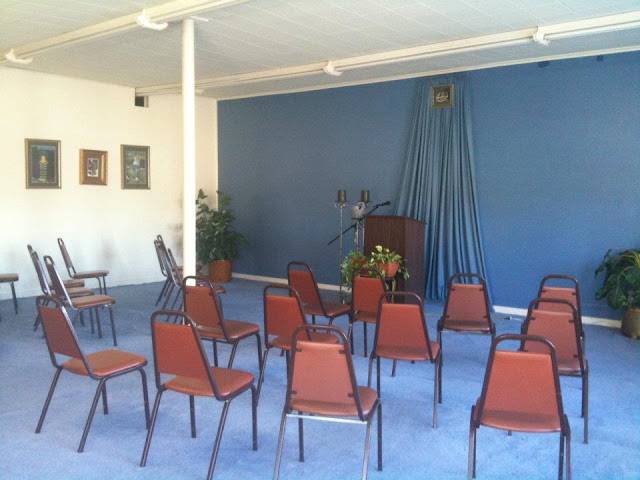 | |
|
I traveled to visit the center one fall Sunday morning to see how the Baha’is worship. I was greeted by a friendly middle-aged black man with tiny silver glasses; a brilliant academic who loves learning named Bill.
“We might not look like much,” Bill told me. “But we can sometimes have twenty or thirty people in attendance on holidays. I think we are more diverse ethnically than any other place of worship in town.”
The service was starting in only a quarter of an hour. Nobody else had arrived yet. I took advantage of this time to ask more questions. “My family is originally from Chicago, where there are more Baha’is than in Waco,” Bill explained. “My parents converted over 40 years ago after seeing the dedicated Baha’i effort in the civil rights movement.” (The United States Baha'i House of Worship, or temple, is located in Wilmette, Illinois. Houses of Worship differ from Haziratu'l-Quds, or local Baha'i centers. The House of Worship is for prayer, meditation, and scripture reading, not for giving sermons. Devotions are held in local centers, such as the one in Waco).
The Baha’i faith teaches about the oneness of God and unity of all humankind, which means a special dedication to the fight for racial equity. My new friend proudly told me about the lives of the Baha'i faith prophets, pulling book after book off wooden shelves, and showing me pictures of places and people.
“Our religion is radical but not illogical,” Bill said. “We don’t water down the power of God or his revelation to mankind. Instead, we try to delve into the unity of all faiths and how they all point back to the same source of goodness and truth.”
We sat on a cracked leather couch, and I got a crash-course on one of the newest and fastest growing world religions. The Baha’i Faith did not originate in Waco. Its origin place is about as far from Waco as one can get: Iran. The religion was founded in the mid-nineteenth century by a man called the Bab, or “the gate” in Persian. He came from a Shia Muslim community, the dominant religion of Persia. The Bab claimed to be a prophetic voice, the Hidden Imam of Shia tradition. He challenged the legalism of Muslim Sharia law and brought a theological argument for the unity of all people and religions.
Baha’is hold that, “throughout the ages, God has sent Divine Messengers known as Manifestations of God—among them Abraham, Krishna, Zoroaster, Moses, Buddha, Jesus Christ, Muhammad, and, in more recent times, the Báb and Bahá’u’lláh—to cultivate humanity’s spiritual, intellectual and moral capacities” (Bahai.org).
It is a faith that has spread far and wide. The worldwide Baha’i population is estimated to be 8 million, and is statistically growing faster than Islam or Christianity. In Waco, however, the community is shrinking and its members are aging fast.
The Baha'is have been in Waco since the mid 1950s. Among the first was Jack McCant and his family. McCant was a Methodist minister who converted and later became one of the U.S. National Spiritual Assembly members of the Baha’i governing body.
 | |
|
As Bill and I talked about the religion, I glanced around the empty room. A large clock on the wall reported that the worship should have started almost 10 minutes ago. My questions had been answered, and we arrived at a lull in the conversation. “Shall we begin?” Bill asked, “It’s about that time.” It seemed it would just be the two of us in the congregation. Bill, it just so happened, was also leading worship that day.
I took a seat in the sanctuary, and he stood at the wooden Baptist-style pulpit to read an opening prayer from the Kitáb-i-Aqdas, the Baha’i holy book. The prayer talked about the unity of God and the oneness of humankind, with something that mirrored a Christian liturgical collect that made special prayers for racial equity and justice in America.
The congregation – just the two of us – stood to sing a hymn. Then, Bill ran from the pulpit to the back of the room to pop in a CD of spiritual instrumental music for a time of personal contemplation and prayer. Afterwards, Bill motioned me forward to the pulpit, “Would you like to read the Scripture for the day for us?”
I read excerpts from the Hebrew Old Testament and the Qur'an. Both verses discussed the wickedness of oppression, reflecting on God’s call for justice. I returned to my seat, and we joined in a collective reading. Then, Bill read a closing prayer, and we listened to another meditative soundtrack. Before I knew it, worship was over. There was no sermon, and it was even shorter and sweeter than an Episcopal service on Superbowl Sunday.
I thanked Bill for his hospitality, took an armload of brochures, and promised to be back. “The thing about us Baha’is is that we don’t really evangelize,” Bill laughed. “But you should come to our special holiday celebration next week. It is the 200th anniversary of the birth of one of our messengers.”
As I left the Baha’i Center that morning, I felt slightly embarrassed at being asked to lead, but was mostly grateful for the hospitality shown to me. I ended up going to the holiday event, a community dinner and film screening to commemorate the birth of the Bab. This time, I took a friend with me, so I’d know that at least three people would be there.
Luckily, at this event, there were about twenty-five Baha’is and friends from other local faith communities. At the dinner, I sat next to a sixty-year-old white woman with dark hair, named Brenda Khozein, who has become a local voice for the Baha’is.
"I have been Baha’i since my twenties. The first Baha’i person I met was also the first black person I ever knew,” she explained. “I grew up in Vidor, Texas, which was a sundown city in those days. The KKK was alive and well, and I remember seeing crosses burning in the fields.”
Like many others, Brenda saw the Baha’i faith as a path to challenging hatred, division, and tribalism in a world dominated by divisive systems of race, class, and supremacy. She was drawn to the ethnic diversity of the congregations and its message of unity. It is this very message of unity that many outsiders find controversial. Many Baha'is have been persecuted in their homeland, Iran, and beyond.
“My husband is from Iran and a sixth generation Baha’i. His family had to flee in the 1970s when the country was overtaken by the clergy and they started persecuting the Baha’is,” Brenda whispered, her eyes welling up with tears. “His uncle stayed and was imprisoned and ultimately killed.”
To Brenda and other believers, the Baha’i faith is persecuted because of its truth. It is only natural that a worldview that preaches egalitarianism would be despised by authoritarian leaders. Followers like Brenda hope that the Baha’i prophets have ushered in a new golden age of humanity, where prejudice and oppression can finally crumble.
It is impossible to not see the allure of the Baha’i religion. There is something about the persistent cheeriness and optimism of the Baha’is–and their worldview–that continues to stick with visitors, even after the service is over.
Learn more about the Baha'i Faith
Waco, Texas Baha'i Center >> https://www.wacobahais.net/
United States Baha'i Website >> https://www.bahai.us/
Worldwide Baha'i Website >> https://www.bahai.org/
Note: This essay was originally published in 2019. When I reached out for permission to use the photos which I have included in this article, Brenda, the local secretary of the Waco Baha'i Spiritual Assembly, told me that due to the COVID-19 pandemic and other issues, the current Waco Baha'i Center has been closed, and that the community is now holding devotions in their homes. She also included a brief message to readers of this blog:
"We Baha’is consider ourselves as “world citizens". As Baha’u’llah (the prophet-founder of the Baha'i Faith) says, “The world is but one country and mankind it’s citizens.”
I love that, and I think, in a way, that's what this blog is all about.
Previously on Sacred Spaces: Seeking Inclusion Through Liturgy at St. Margaret's Episcopal Church, Washington, D.C.

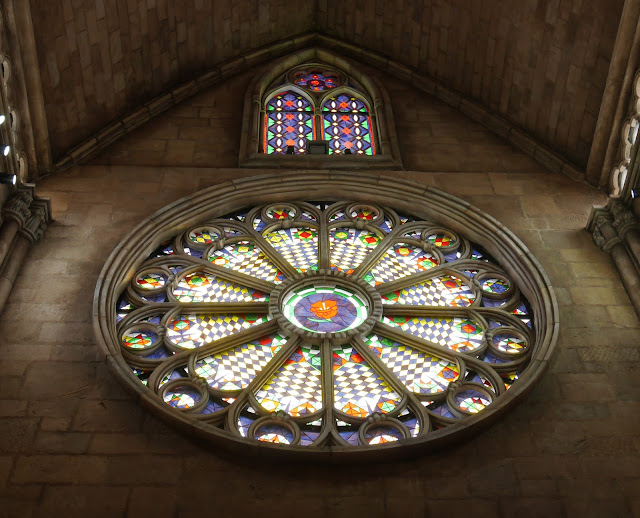
.JPG)
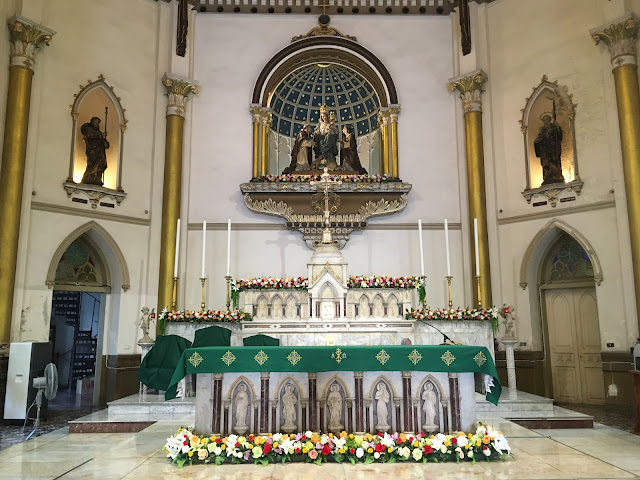
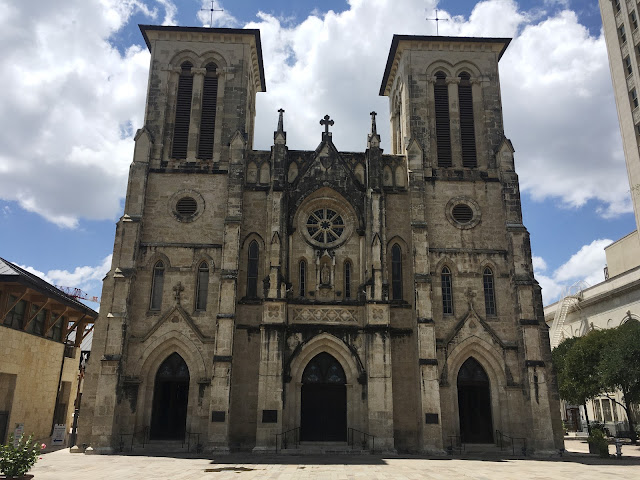
Comments
Post a Comment